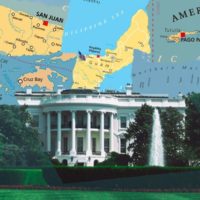
SLATE, a progressive online publication has featured statements by Tuala-uta Rep. Larry Sanitoa on topical issues affecting American Samoa.
Titled, “The Biggest Issues in the Places Where Americans Can’t Vote for President,” it features the views of one lawmaker from each of the territories.
On the section on American Samoa SLATE says: “First, some good news that a president attuned to matters of public health might want to note: American Samoa has had zero—not even one! Zero!—cases of the coronavirus, after taking strict measures including sealing itself off from outside travelers in late March, with no passenger flights into the territory since then.
“This did, however, strand numerous residents who had been traveling and still haven’t gotten home. But the big concern that Larry Sanitoa, a member of the American Samoa House of Representatives, wants to discuss is meth (generally called “ice” in the territory), which he says has become a widespread problem. (In 2018, territorial police seized more than $1 million of the drug, in the course of 25 raids—a significant amount for a place with a population of about 55,000.)Part of the issue, Sanitoa says, is a matter of tracking the source of the drug—much of it is likely coming in from elsewhere, and if there was better understanding of the trafficking routes, it would be easier to stop it.
Sanitoa points to 2012 as a tipping point, when the local FBI office closed due to budget constraints.
“In the old days we used to arrest people in Hawaii, we would arrest people into the states,” he says. “Because the FBI was involved, and that was wonderful because we knew then where the drug was coming in.”
The territory’s current governor, Lolo Matalasi Moliga, is not running for reelection (due to term limits), but Sanitoa hopes that the next governor will “work closely with our congresswoman and, hopefully, with the president of the United States to look at directing federal resources to trying to work on this.”
There’s also the matter of long-term economic development and a lack of a diversified economy—both perennial topics in all territories—and here, Sanitoa has a particular interest in changing cabotage laws and the Jones Act.
These are laws that restrict transit and commerce between two U.S. destinations (say, American Samoa and Hawaii) by non-American carriers (say, Samoa Airways, which is based in the independent nation of Samoa); these limitations, in turn, reduce competition (in this case, which is not hypothetical but very real, the only flights between American Samoa and the rest of the USA, during non pandemic times, are on Hawaiian Airlines).
“Since we’re so far away from everybody, if we’re ever going to get tourism working or perhaps more trade working, we have to have these foreign carriers,” Sanitoa says. “Congresswoman Aumua Amata, she’s trying very hard, but I think it’s got to go up to the next level because obviously, there’s a reason why we can’t get a waiver” to the cabotage laws.
Changing the law, though, is unlikely to happen anytime soon: As the publication WorkBoat recently documented, both Biden and Trump have voiced support for the Jones Act.





